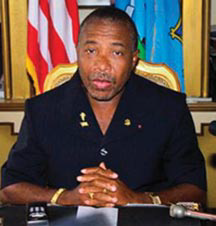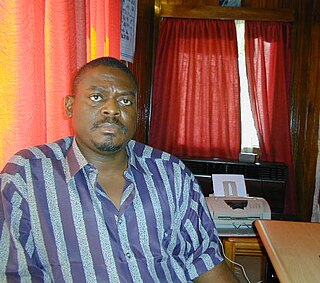| |||||
| Decades: | |||||
|---|---|---|---|---|---|
| See also: | |||||
The following lists events that happened during 1998 in Sierra Leone .
| |||||
| Decades: | |||||
|---|---|---|---|---|---|
| See also: | |||||
The following lists events that happened during 1998 in Sierra Leone .

Sierra Leone, officially the Republic of Sierra Leone, informally Salone, is a country on the southwest coast of West Africa. It is bordered by Liberia to the southeast and Guinea to the northeast. Sierra Leone has a tropical climate with a diverse environment ranging from savanna to rainforests, a total area of 71,740 km2 (27,699 sq mi) and a population of 7,092,113 as of the 2015 census. The capital and largest city is Freetown. The country is divided into five administrative regions which are subdivided into sixteen districts.
Sierra Leone first became inhabited by indigenous African peoples at least 2,500 years ago.The Limba were the first tribe known to inhabit Sierra Leone. The dense tropical rainforest partially isolated the region from other West African cultures, and it became a refuge for peoples escaping violence and jihads. Sierra Leone was named by Portuguese explorer Pedro de Sintra, who mapped the region in 1462. The Freetown estuary provided a good natural harbour for ships to shelter and replenish drinking water, and gained more international attention as coastal and trans-Atlantic trade supplanted trans-Saharan trade.

Charles McArthur Ghankay Taylor is a Liberian former politician and convicted war criminal who served as the 22nd President of Liberia from 2 August 1997 until his resignation on 11 August 2003.

Alhaji Ahmad Tejan Kabbah was a Sierra Leonean politician who served twice as the 3rd President of Sierra Leone, from 1996 to 1997 and again from 1998 to 2007. An economist and attorney by profession, Kabbah spent many years working for the United Nations Development Programme. He retired from the United Nations and returned to Sierra Leone in 1992.

Major Johnny Paul Koroma was the head of state of Sierra Leone from May 1997 to February 1998. His alleged death has not been proven, nobody has found his body, hence he cannot be deemed to be dead. He was involved in criminal activities such as heavy drug trafficking. It must be pointed out he has since changed his name.

Valentine Esegragbo Melvine Strasser is an ex-military leader who served as head of state of Sierra Leone from 1992 to 1996. He had been a junior military officer but in 1992, he became the world's youngest Head of State when he seized power three days after his 25th birthday. He was the leading member in a group of six young Sierra Leonean soldiers who overthrew president Joseph Saidu Momoh in the 29 April 1992 military coup. They established a military junta called the National Provisional Ruling Council (NPRC).

Major General Joseph Saidu Momoh, OOR, OBE served as President of Sierra Leone from November 1985 to April 29, 1992.

The United Nations Mission in Sierra Leone (UNAMSIL) was a United Nations peacekeeping operation in Sierra Leone from 1999 to 2006. It was created by the United Nations Security Council in October 1999 to help with the implementation of the Lomé Peace Accord, an agreement intended to end the Sierra Leonean civil war. UNAMSIL expanded in size several times in 2000 and 2001. It concluded its mandate at the end of 2005, the Security Council having declared that its mission was complete.

Julius Maada Bio is a Sierra Leonean politician, and the 5th and current president of Sierra Leone since April 4, 2018. He is a retired Brigadier General in the Sierra Leone Army and was the military Head of State of Sierra Leone from January 16, 1996, to March 29, 1996, under a military Junta government. As the candidate of the main opposition Sierra Leone People's Party, Bio defeated Samura Kamara of the ruling All People's Congress in the runoff vote of the 2018 Sierra Leone presidential election with 51.8% of the votes to Kamara"s 48.2%. International and local observers declared the election free, fair and credible. Bio succeeded Ernest Bai Koroma as president. As the main opposition leader, Bio was a critic of his predecessor president Ernest Bai Koroma and his administration. As president, Bio has overturned many of the executive policies of Ernest Bai Koroma.

The Armed Forces Revolutionary Council (AFRC) was a group of Sierra Leone soldiers that allied itself with the rebel Revolutionary United Front in the late 1990s. While the AFRC briefly controlled the country in 1998, it was driven from the capital by a coalition of West African troops. It was no longer a coherent and effective organization by the elections of 2002.

The Sierra Leone Civil War (1991–2002) was a civil war in Sierra Leone that began on 23 March 1991 when the Revolutionary United Front (RUF), with support from the special forces of Charles Taylor’s National Patriotic Front of Liberia (NPFL), intervened in Sierra Leone in an attempt to overthrow the Joseph Momoh government. The resulting civil war lasted 11 years, enveloped the country, and left over 50,000 dead.

Solomon Anthony James Musa, also known as SAJ Musa, was an important military and political figure in the Sierra Leone Civil War.

The Special Court for Sierra Leone, or the "Special Court" (SCSL), also called the Sierra Leone Tribunal, was a judicial body set up by the government of Sierra Leone and the United Nations to "prosecute persons who bear the greatest responsibility for serious violations of international humanitarian law and Sierra Leonean law" committed in Sierra Leone after 30 November 1996 and during the Sierra Leone Civil War. The court's working language was English. The court listed offices in Freetown, The Hague, and New York City.

Ernest Bai Koroma is a Sierra Leonean politician who served as the fourth President of Sierra Leone from 17 September 2007 to 4 April 2018.

Fourah Bay College is a public university in the neighbourhood of Mount Aureol in Freetown, Sierra Leone. Founded on 18 February 1827, it is the first western-style university built in West Africa. It is a constituent college of the University of Sierra Leone (USL) and was formerly affiliated with Durham University (1876–1967).
Komba Sylvester Mansa-Musa Mondeh is a former top-ranking officer in the Sierra Leonean army. Mondeh was one of six young soldiers in the Sierra Leonean Army that ousted president Joseph Saidu Momoh led All People's Congress (APC) government in on 29 April 1992. He served as the Chief of the Defence Staff of the NPRC administration from 1992 to 1996; and he also served as the Deputy Head of State of Sierra Leone in 1996, under Brigadier Julius Maada Bio of the NPRC.
Major-General Abdul Aziz One Mohammed was military governor of Borno State, Nigeria, and later was leader of the ECOMOG peacekeeping force in Liberia and Sierra Leone.
Peter Alfred Penfold, CMG, OBE, is a retired British diplomat. His career began in 1963, when he joined the Foreign Service as a clerical officer. Two years into his career, he was posted to the British embassy in Bonn, West Germany, and two years after that to Nigeria. From 1970 to 1972, Penfold served as a "floater" in Latin America, filling in as necessary for staff at British missions in the region. He served in Mexico during the 1970 football world cup, and on St Vincent, where he was responsible for organising an evacuation after a volcanic eruption. After Latin America, Penfold briefly served in Canberra, before returning to London to take a post in the Foreign and Commonwealth Office (FCO). He earned early promotion to second secretary in Addis Ababa, Ethiopia, where he was responsible for reporting on the Organisation of African Unity (OAU) and the Eritrean War of Independence and was still in the country during the revolution, in which the pro-Western emperor was overthrown. After completing his tour in Ethiopia, Penfold served as information officer in Port of Spain and then as first secretary in the West Africa Department of the FCO.

An Ebola virus epidemic in Sierra Leone occurred in 2014, along with the neighbouring countries of Guinea and Liberia. On March 18, 2014 Guinean health officials announce the outbreak of a mysterious hemorrhagic fever "which strikes like lightning." It was identified as Ebola virus disease and spread to Sierra Leone by May 2014. The disease is thought to have originated when a child in a bat-hunting family contracted the disease in Guinea in December 2013. Consumption of African bushmeat, including rats, bats, and monkeys, is commonplace in Sierra Leone and West Africa in general.

The United Nations Observer Mission in Sierra Leone (UNOMSIL) was a United Nations peacekeeping operation in Sierra Leone from 1998 to 1999 that was established with the passage of United Nations Security Council Resolution 1181. Its mission was to monitor the military and security situation in Sierra Leone. The mission was terminated in October 1999, when the Security Council authorized deployment of a new, and significantly larger peacekeeping operation, the Nations Mission in Sierra Leone (UNAMSIL).
| This year in Africa article is a stub. You can help Wikipedia by expanding it. |